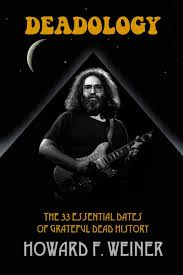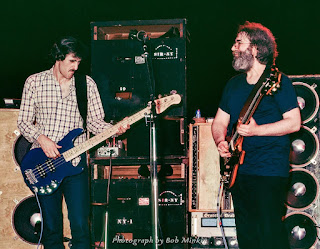Deadhead Bill Walton was the king of college basketball
when the Grateful Dead rolled into Pauley Pavilion, home of the UCLA Bruins, on
November 17, 1973. Pauley Pavilion was the house where Walton and his coach,
John Wooden, imposed their basketball dominance. Wooden was the great teacher
in Bill’s life. When Walton looked for inspiration beyond the basketball court,
he was enamored with the music of the Grateful Dead, and “Jack Straw” was his
favorite song. The UCLA Bruins had won seven NCAA titles in a row, and they
were nearing the end of an 88-game unbeaten streak. The Grateful Dead had
recently released Wake of the Flood
and they were thriving in their prime. This evening was destined for immortality.
The rare “Me and My Uncle” opener gets
11-17-73 off to a festive yet modest start. The aura of the evening changes
with a big hitter in the second slot, “Here Comes Sunshine.” The group
harmonies capture the optimistic sweep of “Sunshine,” and Garcia’s guitar soars
from the onset. Kreutzmann’s drumming is sublime as he leads the band through
various shifts in tempo and volume. This soundboard recording is a treasure
capturing the Dead in a state of virtuosic bliss. A luxurious “Here Comes
Sunshine” at this early stage was a good omen.
“Looks Like Rain” was a succinct selection performed
elegantly after “Sunshine.” The set rolls on in Old Weird America mode for a
few numbers. The seventh song, “The Race is On,” features short and tasty solos
by Jerry and then Keith. Godchaux’s piano playing was inspired all night long.
China Cat > Rider follows. This frisky “Cat” purrs and roars its way into a
sublime “Feeling Groovy” detour. The 11-17-73 Cat > Rider gets my vote for
best of the year. Crisp renditions of “Big River,” “Brown-Eyed Women,” and
“Around and Around” complete a robust opening set.
“Row Jimmy” provides a hypnotic start to set
two. It’s the only time the Dead have opened a set with “Row Jimmy.” With the
low-pressure yet rare set openers on this night, the band was ascending their
way towards greatness. After “Jimmy” there’s a “Jack Straw” for Bill Walton,
and the trilogy of songs based on Robert Hunter characters concludes with
“Ramble on Rose.” Keith’s piano playing is prominent here as “Rose” rolls with
a ragtime feel. A week earlier, they gave birth to the Playin’ > UJB >
Dew > UJB > Playin’ loop to start set two in the Winterland. In UCLA, the
Dead had created the ideal ambiance for the second performances of the consecrated
loop.
Transcendence begins with the start of the
“Playin’” jam. It has a different feel and pace than the relentless scorcher
from 8-27-72 Venita, but this jam has that same jaw-dropping effect. Garcia
dominates Venita. The UCLA version is sophisticated, and there’s more space for
Phil and Billy to go off early. Once Garcia starts to unload, he weaves a
tapestry of unique riffs and bubbling leads into a spellbinding symphony.
“Uncle John’s Band” casually arises from the
“Playin’” wilderness. There’s a royal essence to the sound of “Uncle John’s
Band.” It has a surreal feel with evocative vocals and a compressed orchestral
ring. This “UJB” can’t be compared to others because it’s serving the higher
purpose of the loop. “Morning Dew” is the centerpiece, but even this
development’s not bigger than the sweep of the loop.
Jerry’s between-verse “Dew” solo churns, burns,
shakes, and shimmies. It’s as if he understands that this performance will be
analyzed and treasured, and he needs to make it stand out. Garcia butchers the
return to the lyrics with consecutive blown lines—trademark masterpiece imperfection.
The ending jam is a swirling whirlwind of group synergy. It’s a hotter “Dew”
than the one on 11-10-73, although it must give way to return to “Uncle
John’s.” The return to “Playin’” is a gripping journey brightened by fusion
fireballs. If you splice together the start and finish of the UCLA “Playin’”
you’d have one of the best versions ever.
The Dead played three standalone tunes before
the legendary loop, and they follow the loop with “El Paso” and a stunning
“Stella Blue.” Set two closed out with Eyes of the World > Sugar Magnolia.
The dynamic closing duo didn’t produce top-flight performances, but they were
better than average, which is amazing after all the music that went down.
“Casey Jones” sent Bill Walton and friends home ecstatic. This was a show fit
for the king of college basketball.
11-17-78 Chicago
The afternoon Rambler Room set is a unique
moment in the second act of Dead history. Like their spontaneous performance
with rented equipment at the Melkweg in Amsterdam on 10-16-81, this show is a
deviation from the chaotic norm of the Grateful Dead Universe. By this time,
the band had developed a zealous following that taped their every public
breath. They were consummate professionals. Off-the-cuff performances like this
acoustic gig in the Rambler Room were things of the past.
Weir opened the acoustic gig with a
respectable version of a Hot Tuna staple, “Whinin’ Boy Blues.” Later in the
set, Weir belted out “KC Moan,” a 1927 number from the Memphis Jug Band. A line
from each of these tunes was later incorporated into “So Many Roads.” Garcia
took advantage of this nostalgic evening by playing a nineteenth century murder
ballad, “Tom Dooley,” which was a number one hit for the Kingston Trio in 1958.
This was a song that Garcia enjoyed in his formative folk years, and his memory
served him well during this recreation, which was included on the bonus disc of
the remastered Reckoning release
(2004). The “Deep Elem Blues” from the Rambler Room is also included on that
superb bonus disc.
The music’s raw and unrehearsed, and the stage
banter is witty as these ramblers connect with their acoustic past. Weir breaks
out a favorite from their 1970 acoustic sets, “Dark Hollow,” and Garcia plays
“Jack-A-Roe.” Weir’s ballad from Heaven
Help the Fool, “This Time Forever,” is a surprisingly moving performance
that has led me to believe that I’ve underrated that album. Our acoustic
troubadours pull off a sweet JGB-style “Knockin’ On Heaven’s Door” in the sixth
slot. The other covers from this eclectic set are “Big Boy Pete” and Buddy
Holly’s “Oh Boy.” When the Dead embarked on their 1980 acoustic/electric run,
the material was rehearsed and plotted. The raw Rambler Room performance was
true spontaneity, almost an impossibility for Garcia and Weir during their last
twenty years of performing under a sea of microphones. Perhaps this show was
the impetus that led to the Dead’s acoustic rebirth in the autumn of 1980.
For more on Nov 17 and the other elite dates in GD history check out Deadology










No comments:
Post a Comment